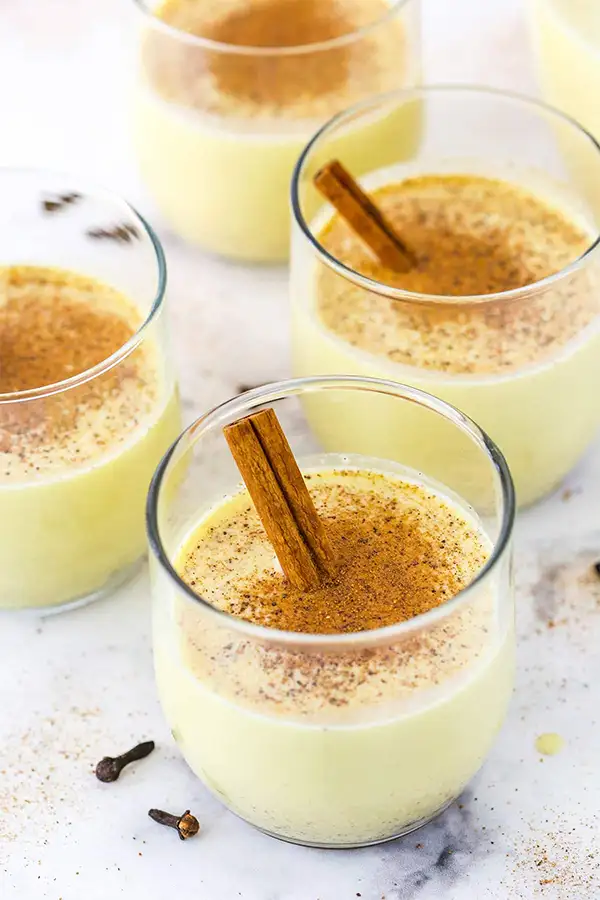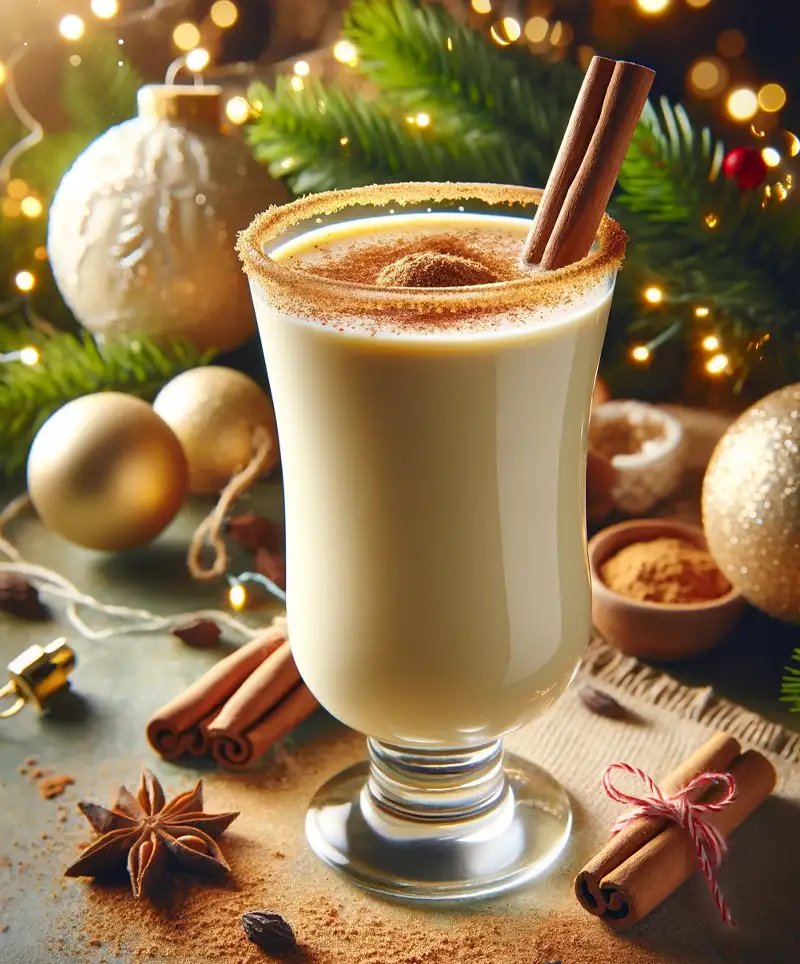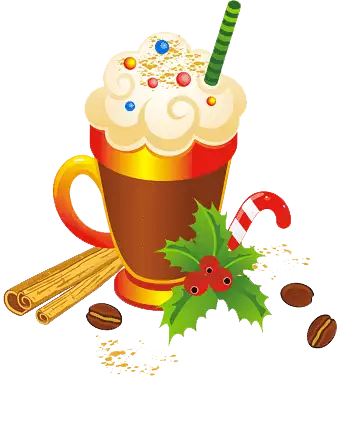A Toast to Tradition and Tastiness!
Eggnog, that luscious, velvety beverage, has been a symbol of holiday cheer and conviviality for generations. With its origins shrouded in the mists of history, this creamy concoction has tickled taste buds and warmed hearts and souls, especially during the chill of winter. National Eggnog Day, dedicated entirely to celebrating this delightful drink, falls in the heart of December. This time of year, already sparkling with lights, laughter, and the spirit of giving, finds an extra dash of joy in eggnog's rich, spiced flavors. Whether served in its classic form or jazzed up with a splash of rum or bourbon, eggnog has a unique way of weaving magic into holiday gatherings. It's a drink that brings people together, evoking memories of cozy evenings by the fire, lively family gatherings, and the sweet anticipation of the festive season. As December unfolds with its myriad celebrations, National Eggnog Day stands out as a tribute to this beloved holiday staple, inviting everyone to raise a glass in honor of tradition, taste, and the timeless joy of the season. What could be a more fitting addition to the holiday festivities than a cup of this creamy, dreamy delight?
A Historical Sip
Looking into the origins of eggnog is like stepping into a deliciously rich piece of history, where each sip reveals a story from centuries past. The journey of eggnog, as we know it today, is a fascinating blend of tradition, evolution, and cultural exchange.
The tale begins in medieval England, where a beverage called "posset" was all the rage, especially among the monastic orders. This early ancestor of eggnog was a warm, creamy ale or wine-based drink, often infused with spices and sweetened with sugar. Eggs and figs were added by those who could afford these luxuries, making it a drink of the affluent. The posset was more than just a delightful concoction; it symbolized hospitality and warmth during the harsh, cold winters.
As the British colonized the New World, they brought their beloved posset with them, but the drink underwent a transformation. In the colonies, where milk and eggs were more readily available than in England, these ingredients became the stars of the beverage. The addition of rum, a common spirit in the Caribbean trade routes and more affordable than the brandy or sherry typically used in England, gave birth to what we now recognize as eggnog.
 Over the years, eggnog became associated with the holiday season, a time for gathering and celebration. This association is believed to have been solidified in the 18th century when the drink was often used in toasts to prosperity and good health. George Washington was known to be fond of eggnog, with a recipe that included a generous amount of alcohol.
Over the years, eggnog became associated with the holiday season, a time for gathering and celebration. This association is believed to have been solidified in the 18th century when the drink was often used in toasts to prosperity and good health. George Washington was known to be fond of eggnog, with a recipe that included a generous amount of alcohol.
As eggnog traveled worldwide, various cultures adopted and adapted the recipe, adding their own local flavors and spirits. In Latin America, for example, you'll find "rompope," a similar eggnog-like drink made with rum or grain alcohol. In Germany, "Eierpunsch" is a popular variant. Each version of eggnog carries the essence of its heritage, making it a drink that's as diverse as delicious.
Today, eggnog remains a cherished part of holiday festivities, embodying the spirit of comfort, joy, and indulgence. Its creamy texture and warming spices continue to bring smiles to faces and warmth to hearts, just as it did centuries ago. The history of eggnog is not just about a drink; it's a story of tradition, adaptation, and the sweet taste of celebration transcending time and borders.
The Name Game
Eggnog, a name as quirky as the drink itself! Have you ever pondered over a glass of this festive brew and thought, “Who on earth named it eggnog?” Well, you're not alone. The name 'eggnog' has puzzled and entertained minds for generations, and the theories behind its origin are as frothy as the drink itself.
First up, let's consider the 'noggin' theory. Back in Ye Olde England, folks used to sip their alcoholic concoctions from a carved wooden mug known affectionately as a 'noggin.' Picture this: a chilly winter evening, a group of merrymakers huddled around a fire, clinking their noggins together. Someone shouts, “More of that egg mix in my noggin, please!” And thus, eggnog was born – or so one theory suggests!
Then there's the more swashbuckling 'egg and grog' theory. Grog, the drink of choice for many a rough-and-tumble sailor, was a mixture of water and rum. When rum entered the colonies, it crashed the posset party, mingling with eggs and milk. The resulting concoction – a heady mix of eggs and grog – could have easily morphed into 'eggnog.' It’s easy to imagine a boisterous colonial tavern, with patrons bantering, “Barkeep, hit me with your best egg'n'grog!” Eventually, slurred words and merry hearts condensed it to 'eggnog.'
Across the globe, eggnog goes by many names, each adding to its mystique. In Germany, it's 'Eierpunsch,' which sounds like a boxing move involving an egg. In Mexico, 'rompope' sounds like what you do at a dance party after having too much nog. And let's not forget the French 'lait de poule,' literally 'hen's milk,' which sounds less like a festive drink and more like an ingredient in a witch's brew.
The name 'eggnog' has permeated culture in ways that go beyond just a holiday drink. It's inspired jokes, puns, and even debates. Some love the name for its whimsical charm, while others scratch their heads, wondering if a marketing opportunity was missed. Could you imagine if it had been named 'Christmas Cream' or 'Yuletide Yolk'? The possibilities were endless!
So, there you have it: the eggnog name game – a blend of history and a dash of mystery. Whether it came from noggins clinking, pirates chugging their grog, or some lost-in-translation moment, one thing is certain – it's a name that's stuck, much like the drink itself sticks to your ribs. Here’s to eggnog, the beverage with a name as rich and delightful as its taste!
Traditionally made with milk, cream, sugar, whipped eggs, and spices like nutmeg, eggnog has evolved over time, embracing many creative variations. From the addition of bourbon, rum, or brandy to vegan versions using almond or coconut milk, there's an eggnog for every palate. Some adventurous souls even add coffee or chocolate for an extra zing!

How to Celebrate
Celebrating National Eggnog Day is easy and enjoyable. Here are some fun ideas:
- Eggnog Tasting Party: Invite friends and family over for a tasting party. Include a range of classic to unconventional eggnogs and discover new favorites.
- DIY Eggnog Recipe Contest: Challenge your guests to concoct their own eggnog recipes. Award prizes for the most creative, the tastiest, and the most unusual eggnog.
- Eggnog-Flavored Treats: Extend the eggnog theme to foods! Think eggnog-flavored cookies, cakes, or even custards. Let your culinary creativity run wild.
- Eggnog in Pajamas: Host a cozy get-together where everyone shows up in their comfiest pajamas and sips on eggnog by the fireplace.
While indulging in this holiday favorite, it's good to remember that traditional eggnog can be quite rich. Enjoy it in moderation to keep your festive spirits high and your health in check.
National Eggnog Day isn't just about savoring a beloved beverage; it's a celebration of tradition, togetherness, and the joyous spirit of the holiday season. So, on this day, raise your glass (or noggin) of eggnog and toast to good health, happiness, and the timeless pleasures of this festive treat. Happy National Eggnog Day!
Please Share our Content






 Over the years, eggnog became associated with the holiday season, a time for gathering and celebration. This association is believed to have been solidified in the 18th century when the drink was often used in toasts to prosperity and good health. George Washington was known to be fond of eggnog, with a recipe that included a generous amount of alcohol.
Over the years, eggnog became associated with the holiday season, a time for gathering and celebration. This association is believed to have been solidified in the 18th century when the drink was often used in toasts to prosperity and good health. George Washington was known to be fond of eggnog, with a recipe that included a generous amount of alcohol.









 "Sláinte!" is a traditional Irish expression used as a toast, equivalent to "Cheers!" in English.
"Sláinte!" is a traditional Irish expression used as a toast, equivalent to "Cheers!" in English.